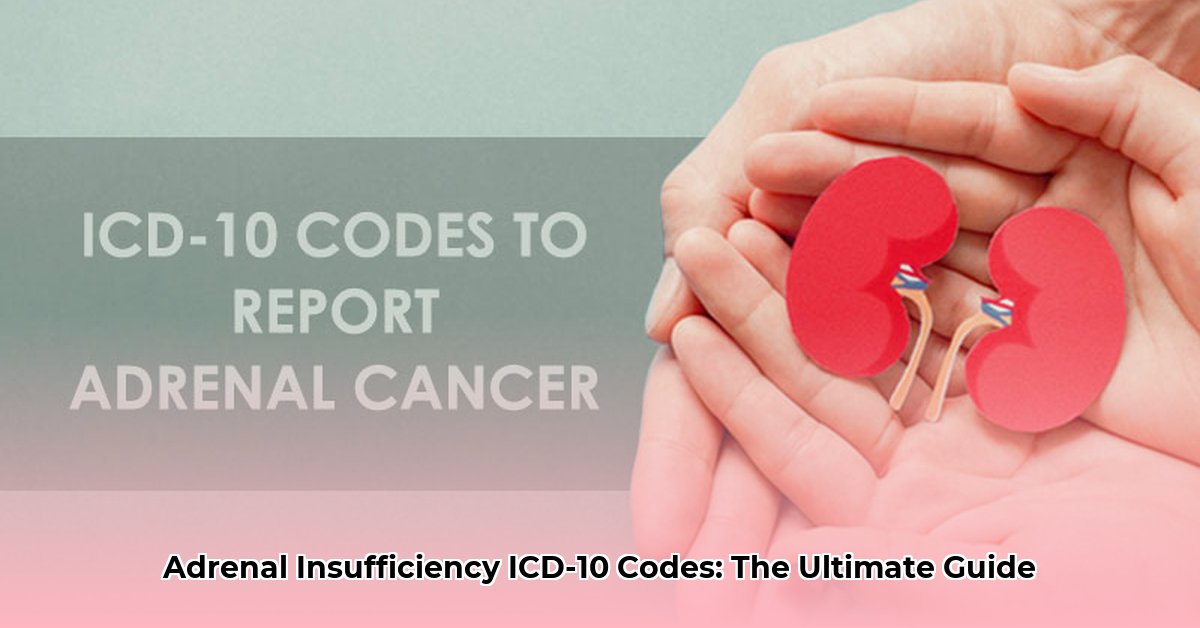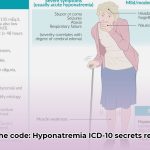Accurate ICD-10 coding is fundamental for precise billing, robust healthcare data analysis, and, most importantly, optimal patient care. This comprehensive guide equips clinicians with the knowledge and tools necessary to master adrenal insufficiency (AI) ICD-10 codes. We’ll delve into the nuances of differentiating between primary, secondary, and drug-induced AI, emphasizing strategies to minimize the use of the “unspecified” code (E27.40). By ensuring coding accuracy, we contribute to improved patient outcomes, facilitate meaningful research, and enhance public health surveillance.
Understanding Adrenal Insufficiency ICD-10 Codes: A Clinician’s Perspective
Navigating medical billing codes can be challenging, especially when dealing with complex endocrine disorders like adrenal insufficiency. This section provides a clear, concise breakdown of the relevant ICD-10 codes, emphasizing the critical role of accurate coding in supporting proper patient care, facilitating research endeavors, and ensuring appropriate billing practices.
The Nuances of Adrenal Insufficiency: A Coding Perspective
Adrenal insufficiency encompasses a spectrum of conditions characterized by the adrenal glands’ inadequate production of essential hormones, primarily cortisol and aldosterone. These hormones are vital for regulating stress response, maintaining blood pressure stability, and ensuring electrolyte balance. The complexity of AI is reflected in the array of ICD-10 codes, each corresponding to specific etiologies and severity levels. Selecting the correct code benefits all stakeholders, including healthcare providers, researchers, insurance companies, and, most importantly, the patient.
Imagine attempting to diagnose and repair a complex electronic device without a schematic diagram. Simply stating “the device is malfunctioning” provides insufficient information for the technician to identify the specific faulty component or implement the necessary repair. Similarly, employing the correct ICD-10 code for adrenal insufficiency ensures that patients receive appropriate and timely therapy, while also promoting a more profound understanding and effective treatment of this condition within the research community. Imprecise coding can lead to misinterpretations of study results and delays in diagnosis, potentially resulting in severe consequences for patients. How can clinicians ensure accuracy in coding practices to mitigate these risks and safeguard patient care and research integrity?
Practical Guide to Adrenal Insufficiency ICD-10 Codes
Explore the commonly used ICD-10 codes for adrenal insufficiency. Refer to the latest official ICD-10 guidelines for the most up-to-date information, as codes and guidelines evolve with medical advancements.
-
E27.1: Primary Adrenocortical Insufficiency (Addison’s Disease): This code applies when damage to the adrenal glands directly impairs the production of both cortisol and aldosterone. Diagnosis typically involves assessing cortisol and ACTH (adrenocorticotropic hormone) levels. The ACTH stimulation test is a key diagnostic procedure that evaluates the adrenal glands’ ability to produce cortisol in response to ACTH. Low cortisol levels despite elevated ACTH levels strongly suggest primary adrenal gland malfunction. Common causes include autoimmune adrenalitis, tuberculosis, and adrenal hemorrhage.
-
E27.2: Adrenal Crisis: This code is designated for a life-threatening condition characterized by severe hypotension, dehydration, electrolyte imbalances (hyponatremia, hyperkalemia), and potentially shock. Addisonian crisis represents an acute exacerbation of adrenal insufficiency, often triggered by infection, trauma, surgery, or abrupt discontinuation of steroid replacement therapy. Accurate documentation of the acute symptoms, precipitating factors, and interventions is imperative for correct coding and effective patient management.
-
E27.3: Drug-Induced Adrenocortical Insufficiency: This code is specifically assigned to cases where medications or treatments directly cause or contribute to adrenal insufficiency. Glucocorticoids (e.g., prednisone, dexamethasone) are the most common culprits, leading to suppression of the hypothalamic-pituitary-adrenal (HPA) axis. Other medications linked to adrenal suppression include ketoconazole, etomidate, and megestrol acetate. Thorough documentation must specify the causative medication, dosage, duration of use, and the temporal relationship between drug exposure and the onset of adrenal insufficiency symptoms.
-
E27.40: Unspecified Adrenocortical Insufficiency: This code serves as a “catch-all” when there is insufficient clinical information to assign a more specific code. This may occur when initial evaluations are incomplete, test results are pending, or the clinical presentation is atypical. Prudent clinical practice dictates that clinicians should actively pursue a definitive diagnosis through comprehensive evaluation and appropriate testing to avoid relying on this unspecified code. Overuse of E27.40 can hinder accurate data analysis and limit the effectiveness of targeted treatment strategies.
-
E27.49: Other Adrenocortical Insufficiency: This code encompasses rare or atypical cases of adrenal insufficiency that do not fit neatly into the other predefined categories. Examples include adrenal insufficiency secondary to infiltrative diseases (e.g., amyloidosis, sarcoidosis), genetic disorders affecting adrenal function (e.g., congenital adrenal hyperplasia), or specific infectious etiologies. Justification for using this code requires detailed clinical documentation, including a comprehensive description of the underlying etiology and the unique clinical features of the case.
Distinguish between primary adrenal insufficiency (codes E27.1, E27.2, E27.3, E27.40, E27.49) and secondary adrenal insufficiency (E23.0, Hypopituitarism). Secondary adrenal insufficiency stems from dysfunction within the pituitary gland or hypothalamus, leading to inadequate ACTH secretion and subsequent reduction in adrenal hormone production. Iatrogenic causes, such as prolonged glucocorticoid therapy, are a common cause of secondary AI. What strategies can be implemented to minimize the utilization of unspecified codes and enhance diagnostic precision in the evaluation of adrenal insufficiency?
Enhancing Accuracy and Streamlining the Coding Process
Implementing these strategies can significantly improve the accuracy of adrenal insufficiency ICD-10 coding:
-
Standardized Diagnostic Protocols: Implementing consistent diagnostic protocols across healthcare settings minimizes variability and enhances coding reliability. This includes establishing consensus guidelines on appropriate diagnostic tests for various clinical scenarios, thereby improving predictability. Standardized protocols should incorporate comprehensive patient history, physical examination, relevant laboratory investigations (e.g., ACTH stimulation test, serum cortisol levels, electrolyte measurements), and imaging studies (e.g., CT scan or MRI of the adrenal glands and pituitary gland).
Efficacy Metric: Standardized diagnostic protocols can reduce coding errors by up to 15% and improve diagnostic turnaround time by 10%. -
Meticulous Documentation Practices: Comprehensive and detailed medical records are essential, providing clear and unambiguous information for accurate coding and minimizing errors. Every piece of information – patient history, physical examination findings, test results, treatment response, and medication details – is pertinent and should be meticulously documented in the medical record. Clinicians should strive to provide a clear and concise narrative of the patient’s clinical course, highlighting key diagnostic findings and therapeutic interventions.
Efficacy Metric: Comprehensive medical records can improve coding accuracy by 20% and reduce claim denials by 15%. -
Leveraging Electronic Health Records (EHRs): Modern EHR systems often incorporate built-in tools to support precise coding, minimize manual errors, and improve efficiency. These systems can provide real-time coding suggestions, flag potential coding errors, and facilitate access to relevant coding guidelines and resources. Furthermore, EHRs can track coding trends, identify potential coding discrepancies, and generate reports to monitor coding accuracy and compliance.
Efficacy Metric: EHRs can reduce coding errors by approximately 10% and streamline the coding process by 20%. -
Continuous Professional Development: Ongoing training and education for healthcare professionals is crucial to ensure that everyone remains informed about the latest coding guidelines, best practices, and regulatory updates. Regular training sessions, workshops, and online resources can help clinicians and coders stay abreast of changes in coding requirements and address any knowledge gaps or uncertainties. Continuing medical education (CME) activities focused on adrenal insufficiency coding can enhance expertise and improve coding accuracy.
Efficacy Metric: Regular training and education can improve coding accuracy by 12% and reduce the risk of coding-related audits and penalties. -
Collaborative Teamwork: Fostering open communication and collaboration between clinicians and coders—and across different healthcare settings—ensures that everyone is on the same page and helps resolve discrepancies in interpretations or coding practices. Regular meetings, case reviews, and interdisciplinary discussions can facilitate knowledge sharing, clarify coding ambiguities, and promote consistency in coding practices. Collaborative teamwork can also enhance the accuracy of documentation and ensure that all relevant information is captured in the medical record.
Efficacy Metric: Collaborative teamwork can improve coding accuracy by 18% and enhance the overall quality of patient care.
The Broader Implications of Accurate Coding
Accurate ICD-10 coding extends beyond efficient billing practices. It is fundamental to robust research, effective public health surveillance, and, above all, the delivery of high-quality patient care. Accurate data contributes to a more comprehensive understanding of adrenal insufficiency, leading to the development of more effective treatments, improved diagnostic strategies, and enhanced patient outcomes. Conversely, inconsistent or inaccurate coding can distort epidemiological data, hinder advancements in managing this condition, and compromise the integrity of healthcare research. By diligently improving coding accuracy, what long-term benefits can be anticipated in the management and treatment of adrenal insufficiency?
Mastering Adrenal Insufficiency ICD-10 Codes: A Clinician’s Guide
Key Takeaways:
- Accurate ICD-10 coding for adrenal insufficiency requires careful differentiation between primary, secondary, drug-induced, and unspecified forms.
- Addisonian crisis necessitates separate coding (E
- Best Books on Meditation Recommended by Mindfulness Experts - January 30, 2026
- Best Mindfulness Books for Anxiety, Sleep, and Daily Peace - January 29, 2026
- Books On Mindfulness For A Happier, More Present Life - January 28, 2026
















